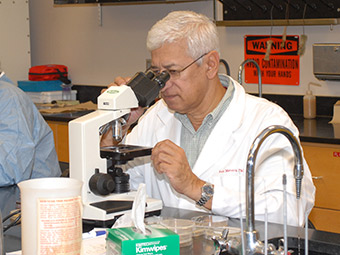Document Type
Article
Publication Date
4-2022
Abstract
Ten strains of entomopathogenic ascomycete fungi, sourced from commercial formulations of blastopore or conidiospore formulations, were tested in 14 different formulations in a primary acquisition/direct spray bioassay against adult Asian citrus psyllid (Diaphorina citri Kuwayama (Hemiptera: Liviidae)). The Cordyceps (Isaria) javanica Apopka 97-C (conidia) strain was used as the standard. A statistical ranking system was established in which top performing pathogenic strains were selected for further screening and eventual field trials. Modified Potter-type spray towers were utilized to deliver a range of doses of viable spores to adult D. citri in an aqueous spray consistent with the rate of spores per hectare often used in real-world spray applications. Mortality was assessed after a seven-day incubation period under controlled climate conditions reflecting those in the Lower Rio Grande Valley (LRGV) of Texas, USA. Of the 14 preparations, the strains Metarhizium anisopliae E9, C. fumosorosea Ifr9901, Beauveria bassiana ATCC 74040 and ANT-03, M. anisopliae ESALQ1037, and M. robertsii DWR2009, showed greater levels of mortality than the standard, Apopka 97-C, in the laboratory setting. Of those six, two (Ifr9901 and ANT-03) were selected for further evaluation based on efficacy, commercial availability, geographical registration, and market outlook on production.
Recommended Citation
Wendel, Justin, Jonathan Cisneros, Stefan Jaronski, Christopher Vitek, Matthew Ciomperlik, and Daniel Flores. "Screening commercial entomopathogenic fungi for the management of Diaphorina citri populations in the Lower Rio Grande Valley, Texas, USA." BioControl 67, no. 2 (2022): 225-235. https://doi.org/10.1007/s10526-021-10128-0
Creative Commons License

This work is licensed under a Creative Commons Attribution 4.0 International License.
Publication Title
BioControl
DOI
10.1007/s10526-021-10128-0



Comments
Copyright © 2022, This is a U.S. government work and not under copyright protection in the U.S.; foreign copyright protection may apply